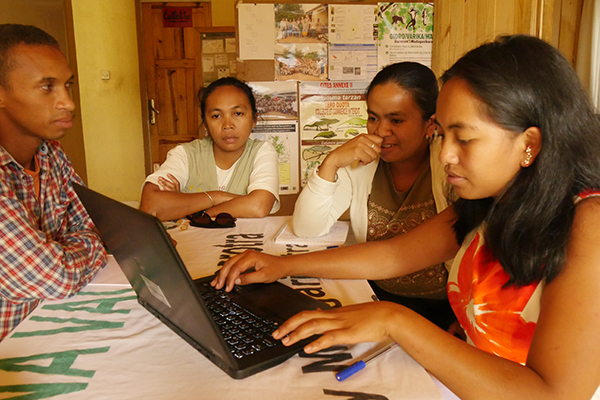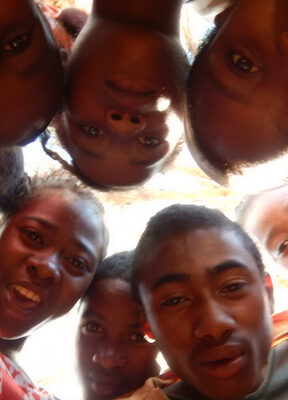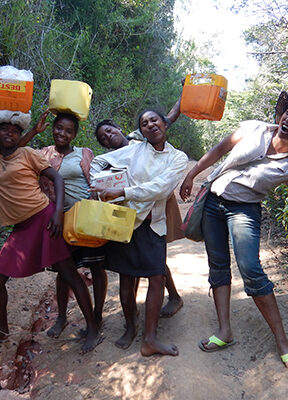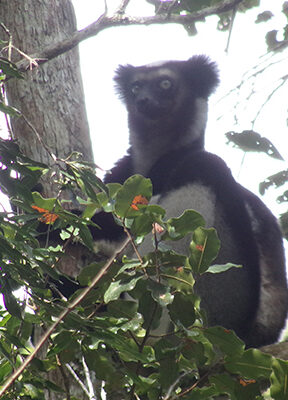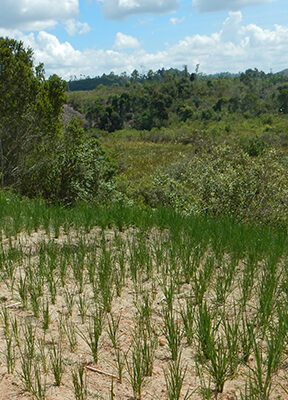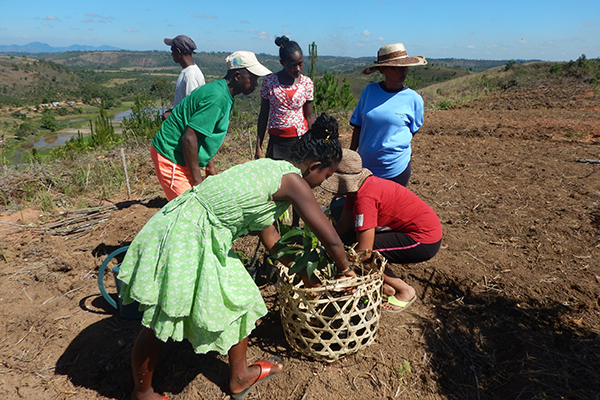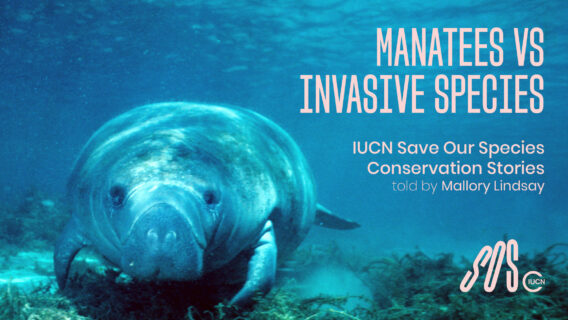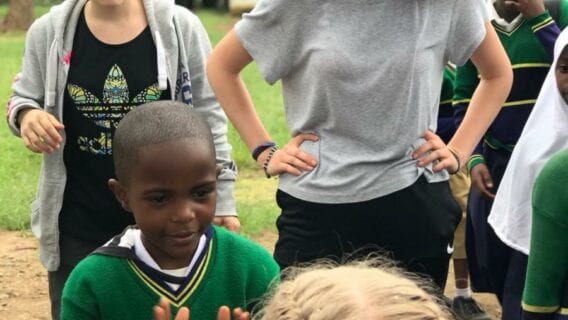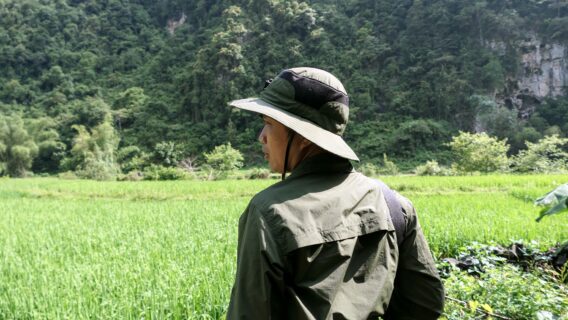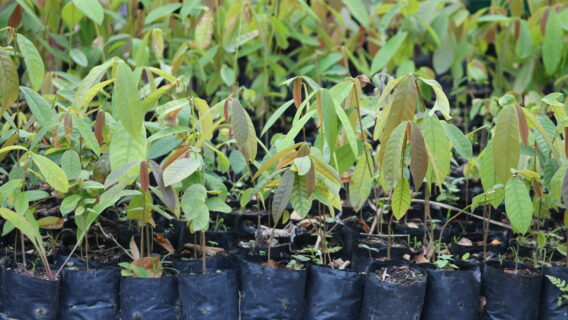Conservation for the Next Generation of Malagasy
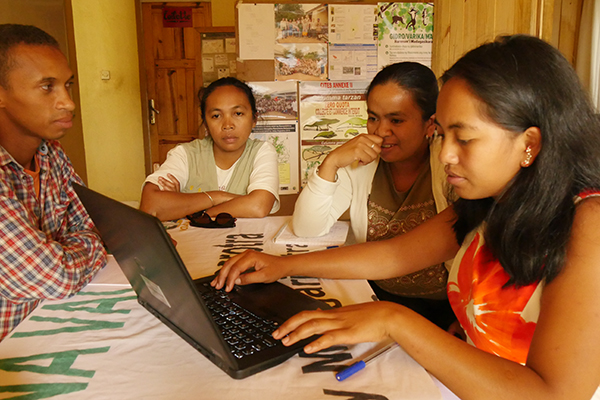
Having completed her studies in engineering, she went on to do an internship with the École Supérieure des Sciences Agronomiques of the University of Antananarivo before joining MV – an NGO lead by Julie Hanta Razafimanahaka. Via remote interview Jessica speaks about her own career, the status of women in Madagsacar, who inspires her work and why she admires those people.
Jessica, how did you get involved in conservation?
“I have loved documentaries on biology, nature, and the environment since my childhood. My degree thesis was about the wildlife trade, as was my first job. I led a field survey on the trade in reptiles and amphibians, working for a PhD student and MV in tandem. My current job is just amazing because I love lemurs and I really like to work with (and for) Malagasy youth.
Can you tell us something about the status of women’s rights in Madagascar?
“Malagasy history and culture used to give lesser importance to women. For example, land is passed on to sons. In the past, the law did not allow wives or daughters to inherit – and a widow was 7th in line for her late husband’s inheritance! In case of divorce, the “Kitay telo an-dalana” used to be applied: two-thirds of the couple’s wealth became the exclusive property of the husband. Girls often got married at 15 and few went to school. So it was challenging for women needless to say.
However, recently the Malagasy Government has been addressing the issue of gender equality. For example, in 2014 the Government subscribed to the UN’s Commission on the Status of Women policy of promoting gender equality at work and promoting women to be economically independent. Progress has been made since then: Madagascar has banned marriage under the age of 18 and has taken measures to improve girls’ school attendance, while 85% of women between 15 and 49 years old have a paid job.
Because of poverty, ignorance of the law, and lack of law enforcement in rural areas, discrimination against women is still a problem nevertheless: many girls still get married while underage, more girls than boys leave primary school prematurely and parents prefer to invest in the careers of boys it seems. Also security for women is an issue: domestic violence is not uncommon. Likewise, the rate of maternal mortality is high – 480 deaths per 100,000 births – because of limited access to medical care before and during birth.”
What is your message to girls and women?
It is not a matter of strength or qualification; it is about how far you will go to stop the damage and to save the species. That said, good education is the foundation of development. My dream is that a good career in wildlife conservation will be open even to youths of very remote areas, especially those living in buffer zones. I want to see youths from the Mangabe Protected Area, where I work, to lead conservation and development projects, both in the office and on the ground.”
I understand there are injustices but I find the work for equal rights has turned into a competition between men and women. We actually want to see each other as partners, not competitors. For me, it is ok not to be the leader if I am not qualified for that, it is also a very important role to support the leader of any given activity.
Who are some of the local conservationists that inspire you?
Madame Honorine: “Currently 10 so-called “Vondron’Olona Ifotony” (VOI), that is, local community groups that volunteer to protect the forest, manage the Mangabe Protected Area in collaboration with Madagasikara Voakajy. Madame Honorine is the only woman among the 10 VOI presidents. Her task is challenging, because forest law offenders are particularly dangerous in the territory she is in charge of. But she does outstanding work: for example, in 2017, she was the first Mangabe VOI president to build an office for her VOI, to found tree nurseries, and to plant forest trees and coffee bushes.
I personally got in touch with Madame Honorine during the launch of our Youths for Lemurs-Lemurs for Youths Project. She helped us so much with the project in her village. I also saw her good leadership at first hand, and heard about her accomplishments and courage.
Given the rate of violence against women, I think she is really brave to live in such a dangerous village among law offenders that target the protected area.”
Madame Raharimalala: “Madame Raharimalala, a teacher in the village of PK 21 is a very good agent of development within the Mangabe Protected Area. She made PK 21 village one of the MV team’s favourite places to stay during field work in Mangabe: she is always hosting us when we go to the field and work with youths in her village.
She did her best to get grants from the charity, the Adsum Foundation in Northern Ireland to build schools, and to deliver access to clean water in PK 21 and three other villages. She is passionate about development and loves nature.
Her school in PK 21 is the first one with a garden, created from the collaboration with the NGO SAF-FJKM Toamasina (“Sampan’Asa momba ny Fampandrosoan / Fiangonan’i Jesoa Kristy eto Madagasikara”).”
Argentine: Just Seventeen years old, Argentine – one of the most inspiring youths in the “Youths for Lemurs-Lemurs for Youths” project – is our only youth ambassador for lemur conservation who still pursues her studies and is neither yet married nor a mother.
Argentine’s devotion to her studies in spite of difficult conditions makes her the pride of her village. Even though they cannot always count on her presence for agricultural work because she goes to high school, her team members in the “Youths for Lemurs-Lemurs for Youths” project support her and are proud of her.
Their agricultural team, called “Kotraika”, are just five people, but they are among the best in terms of raising awareness about lemurs and in discipline, and also in agriculture despite being so few in number.”
About Madagasikara Voakajy (MV)
MV is a Malagasy NGO, founded in 2005 and a member of IUCN since 2016, which focuses on the conservation of Madagascar’s endemic species (e.g. frogs, bats, chameleons, lemurs, and baobabs) and their habitats. In 2015, MV won IUCN Save Our Species funding for their “Youths for Lemurs-Lemurs for Youths” project, which aims at teaching the young people of the Mangabe Protected Area (Alaotra-Mangoro Region, Eastern Madagascar) to care about lemur conservation, to fight against illegal hunting, habitat loss and habitat degradation, and engage in sustainable agriculture. This is the second grant awarded to MV for its work on threatened species through IUCN Save Our Species. Learn about its Golden Mantella project here.
Jessica, many thanks for your insights and inspiration about conservation in Madagascar! Good luck with the “Youth for Lemurs-Lemurs for Youths” Project!

